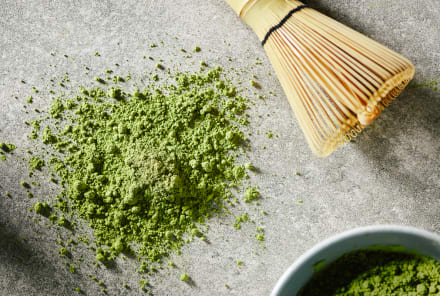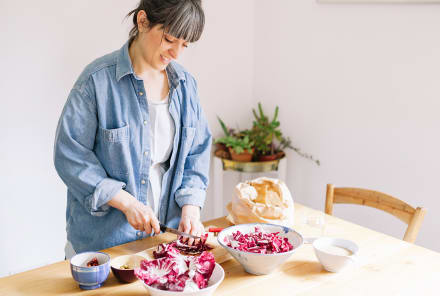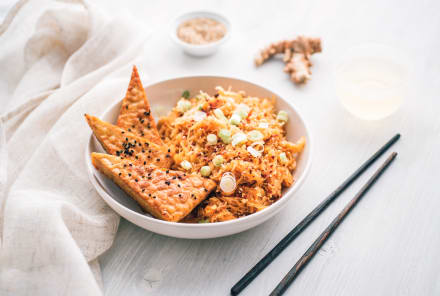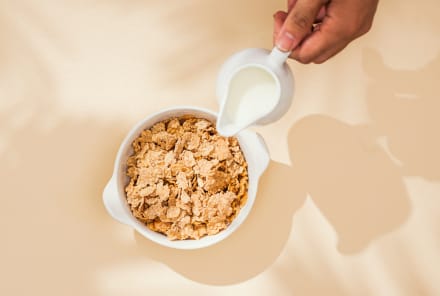Advertisement
With the new year in full swing, I wanted to spend two weeks focusing on finding ways to get more centered, improve my sleeping habits (which were admittedly terrible, leaving me tossing and turning most nights), and overall quality of my life—because isn't that what we all want (and need) at the end of the day? I decided to focus on an Ayurvedic diet, rich in foods suited to my body type and lifestyle—a diet that wasn't rooted in having to remove the foods I've found to work so well for me and without the need to count calories or make my already clean diet any more restrictive.
Before diving in, you're probably wondering, what exactly is Ayurveda anyway?
To put it simply, Ayurveda is an ancient practice that originated in India thousands of years ago and focuses on the ultimate connection between your mind, body, and nature. In Ayurveda, it's crucial that you identify your Dosha type (Vata, Pitta, Kapha), as your type helps one better identify where their energies are in flux and in need of balancing. Each Dosha has its own list of diet recommendations, and overall practices that aim to bring one's body into balance.
To kick things off, I chatted with Dr. Amy Shah, an M.D. (and mbg class instructor!) who mixes Ayurveda with traditional Western practices. To assess my Dosha, she gave me a series of 40 simple questions involving physical, emotional, and mental characteristics (you can find your own quiz here). I inevitably was as Vata as it gets—no surprise there. In Dr. Shah'’s words, Vata types generally have:
- Dry skin
- Cracking joints
- Cold hands, feet
- Restless eyes, hands, feet
- Delicate body types
- A tendency to talk and walk quickly
- Trouble staying in one place
- Subtle fears, anxieties, insecurities
- A love for travel
…if you know me, you'd know that (most and/or all of) the above describe me IN A NUTSHELL.
From there, I spoke with mbg class instructor, best-selling author, and celebrity nutritionist Kimberly Snyder, to assist with my diet plan for the coming weeks. To start, Kimberly emphasized the importance of eating as many warm, grounding foods as possible, especially during New York's chillier winters. She also mentioned that when Vata types are imbalanced, they're more prone to insomnia and anxiety—again, it's like she was reading my mind. Safe to say, I was more than ready to tackle whatever Ayurvedic diet plan Kimberly had for me. If her guidance could help with my current sleep schedule (or lack thereof), I was more than in. She then recommended introducing the following to my daily routine, with an emphasis on foods that fell under the sweet, salty, or sour categories:
- More ghee, coconut oils (meant to help with lubrication and digestive issues; I loved the pastured ghees from Fourth & Heart)
- More warming spices (like ginger and cumin, which help with immunity)
- More brown rice (easy to digest, known to produce extra heat)
- More bedtime elixirs (with hemp milk, turmeric, black pepper—known to help with serotonin levels)
- More herbal teas; less caffeine (caffeine's known to amplify anxiety levels)
- Eating seasonally (i.e., make root veggies your bff)
- Daily self-massage (also known as abhyanga)
I also worked with both women to map out exactly what I'd be eating in the coming weeks. Turns out, my biggest undertaking would be amping up the ghee (not a problem), minimizing any sources of caffeine, and getting rid of those drier, crunchier foods I've grown to love…i.e., raw apples, rice cakes, and popcorn, to start.
Here's exactly what I ate
Most mornings, I started my day with brown rice porridge, goat milk yogurt, ground flax, banana, and cinnamon. I replaced my morning cup of java with chai, and lunched on warming curries made with red lentils, spinach, zucchini, sweet potato, and brown rice with "golden milk" (blended with ghee) on the side. I replaced my afternoon apple and almond butter with sweet potatoes or bananas with almond butter and noshed on more grounding stews or egg scrambles with avocado, ghee, and brown rice tortillas for dinner. Before bed, I'd sip another warming elixir and, believe it or not, sleep soundly.
My results
Did I eat a lot of the same foods over the past few weeks? Sure. However, I usually do. Did I miss my morning coffee? Not really, as I ultimately replaced it with something just as delicious. I also noticed no change in energy levels or mood. In reality, I felt more relaxed and even-tempered during this experiment than I have in months. Although I was snacking less, I still allowed myself to reach for those sweeter fruits, nut butters, and extra servings of curry when desired. While I often go from satisfied to starving in the span of five minutes, I hardly experienced any mood swings or hunger extremes during this time.
Where I'd normally reach for a handful of plantain chips or a rice cake with almond butter to tide me over, I found myself instead making warming elixirs (which quite honestly was way more fun and satiating).
This challenge left me feeling stronger in my yoga practice, my skin had minimal issues or breakouts (even with the increased consumption of ghee and dairy), I felt less anxious and restless, and I even slept most nights.
While I look forward to reincorporating certain foods and cuisines into my diet (hello, Mexican food), I'm going to continue replacing my morning coffee with tea (on weekdays, at least), experimenting with various curry recipes, eating less produce in its raw form, ending my nights with golden milk elixirs and continuing to embrace ghee on every level. Ghee's the new everything, after all.
At the end of the day, it's all about slowing down and listening to your body anyway. And if my body's craving a dry red wine, I won't deny myself. Though I will continue to experiment with different curries and keeping my caffeine intake to a minimum. Because, as much as I love a cozy mug of coffee, I love a cozy night's sleep even more.
Want to try it yourself? Here's a one-day diet to kick off your own Ayurveda experiment.

How To Make Healthier Homemade Jams And Spreads + 10 Fruits To Use
Michelle Konstantinovsky

What Is Coconut Sugar? Here's The Deal On This Cane Sugar Alternative
Michelle Konstantinovsky

How To Make Healthier Homemade Jams And Spreads + 10 Fruits To Use
Michelle Konstantinovsky

What Is Coconut Sugar? Here's The Deal On This Cane Sugar Alternative
Michelle Konstantinovsky

How To Make Healthier Homemade Jams And Spreads + 10 Fruits To Use
Michelle Konstantinovsky

What Is Coconut Sugar? Here's The Deal On This Cane Sugar Alternative
Michelle Konstantinovsky

How To Make Healthier Homemade Jams And Spreads + 10 Fruits To Use
Michelle Konstantinovsky

What Is Coconut Sugar? Here's The Deal On This Cane Sugar Alternative
Michelle Konstantinovsky















